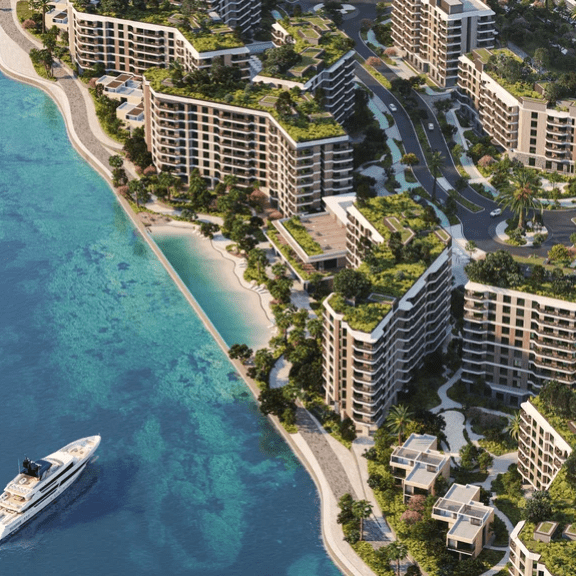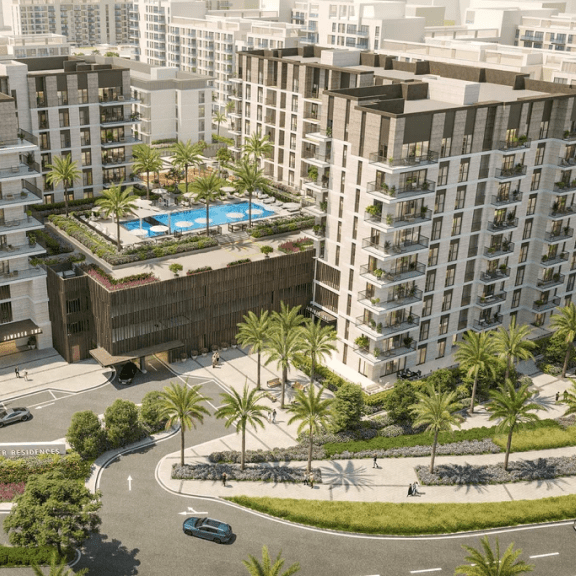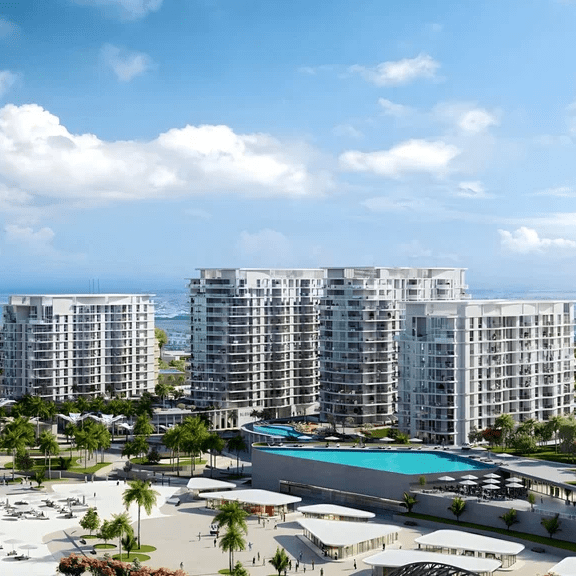Foreigners buying real estate in Dubai can get an instalment plan from a property developer or take out a mortgage at a local bank. This makes investing here even more attractive. As a rule, banks offer different mortgage terms for locals and foreign nationals. At the same time, however, at some local banks foreigners with residence permits can take out a loan on the same terms as UAE citizens. Let’s take a look at the mortgage plans offered by Emirates Islamic to expats.
- How to Find Out if You Are Eligible for a Mortgage from Emirates Islamic
- How to Calculate the Mortgage Plan from Emirates Islamic
- Example of the calculation of the mortgage from Emirates Islamic
- Emirates Islamic mortgage options
- Documents Required to Take Out a Mortgage from Emirates Islamic
- Mortgages in the UAE
How to Find Out if You Are Eligible for a Mortgage from Emirates Islamic
Before you apply for a loan, check if the bank will in principle issue a mortgage to you. To undergo a preliminary check at the bank, you have to fill in a special form on the website of Emirates Islamic and provide the following information:
- your income in AED;
- your status (expat or UAE citizen);
- the total monthly amount that you have to pay on existing loans, if any, in order to calculate the possible additional loan debt.
To understand how the bank conducts the review, let’s apply the hypothetical source data of a potential customer. Let us assume that the monthly income of a foreign resident is AED 37,000 (USD 10,000) and the individual has no other loans. In this case, the individual may be eligible for a mortgage. The lack of any outstanding loans will enable an expat to pass the check even if he earns half as much.
New buildings in the UAE
However, if the expat has other loans, after deducting such payments, the expat should have over AED 15,000 (USD 4,083) available to be eligible for a new loan. In the case of local citizens, they must have AED 8,000 available after deducting such payments. If the amount of available funds is borderline, it is highly likely that your mortgage application will be rejected.
It is advisable to consult with a representative of the bank first before taking the check, as the online preliminary check does not cover all the nuances that may affect the decision of the bank based on a more detailed review on whether to grant a mortgage or not:
- the age of the applicant (it is harder to take out a loan if you are retired),
- employment status (along-term contract with stable income/self-employed/retired/etc.), and
- the dependent relatives of the expat (if any).
This information may affect the maximum possible term of the mortgage, as well as the calculation of the applicant’s financial solvency. For instance, if an expat is sponsoring visas for family members, the upkeep of dependants will be deducted from monthly income and the remaining amount could be deemed insufficient.
How to Calculate the Mortgage Plan from Emirates Islamic
After preliminary approval of a customer at Emirates Islamic, the bank will start calculating the mortgage plan. At this point the applicant must provide the following information:
- the cost of the selected real estate;
- the amount of your available funds (15% of the total purchase price for UAE citizens and 25% for expats);
- the amount of the required mortgage;
- a mortgage interest rate of 3% to 6% per annum, depending on various factors. So it is advisable to clarify the figure at the bank (in our example, we base the calculation on an interest rate of 5% per annum);
- the term of the mortgage in months (maximum of 300 months, in other words, 25 years).
Photo: Michael Siebert (Pixabay)
Example of the calculation of the mortgage from Emirates Islamic
Option of calculating the mortgage for flats costing AED 1,600,000 (USD 435,000).
We assume that you have already selected the flats and that they cost AED 1.6 million (USD 435,000). The initial instalment from your own funds will be AED 400,000 - 25% of the total cost. The required amount of the mortgage equals AED 1.2 million. As the maximum amount of the mortgage that Emirates Islamic can give to a non-citizen is AED 1.5, the mortgage plan is still possible. Let’s choose the maximum repayment period of 300 months and a 5% interest rate per annum. In this case, the monthly payment will equal AED 35,221.
If we were to factor in a smaller repayment period of 240 months (20 years), the payment would be reduced to AED 31,792 a month. If you take out instead a mortgage for only 10 years, the monthly repayment would equal AED 25,496. This clearly shows that it is cheaper to take out a mortgage for a shorter period, as the total amount and monthly payments will be smaller.
Now, let’s calculate the mortgage if you buy a property worth AED 1,000,000 (USD 272,257).
If you buy such a property and pay an initial instalment of 40% (AED 400,000), the required mortgage equals AED 600,000. If you take out a mortgage for 10 years at 5% interest per annum, the monthly payment will equal AED 12,748.
If you take the same mortgage for the same period and at the same interest rate, but only make a down payment equal to 25% of the property, you will have to repay AED 15,935 a month.
Photo: Makalu (Pixabay)
Emirates Islamic mortgage options
Emirates Islamic offers two types of mortgages: Bina’a Home Construction Finance for UAE citizens with confirmed stable income and Manzili Property Purchase Finance for expats, foreign residents of the UAE and other non-citizens. In other words, the second option is available for any foreigners who would like to take out a mortgage to buy real estate in the UAE. However, it is almost impossible to get one unless you are a resident of Dubai. So it is essential that you obtain a residence permit before applying for the mortgage.
Manzili Property Purchase Finance offers the minimum size of down payments for expats. Emirati citizens must pay at least 15% of the property value, while the minimum requirement for expats is 25%.
The maximum mortgage you can take out is AED 1.5 million. The maximum period is 25 years. Please note that the bank charges 1% commission for the deal.
Documents Required to Take Out a Mortgage from Emirates Islamic
To obtain a mortgage from Emirates Islamic, you will have to provide the documents listed below:
- a copy of your valid passport and visa;
- a copy of your employment contract;
- salary statement issued no more than 45 days before applying for the mortgage;
- a letter from the employer on transferring your salary to Emirates Islamic (while this is not a mandatory requirement, you can start receiving your salary at the bank. As a result, your income and mortgage deductions will be stored at one place);
- bank statements for the past six months;
- tax returns for the past two years if they were filed in the UAE;
- a certificate of any current loan that you are repaying, which must be issued nor earlier than 30 days prior to the signing of the new mortgage agreement;
- an official offer from the seller;
- the property purchase agreement;
- the certificate of title and the property's plan;
- a receipt, with confirmation of the payment of the initial instalment with your own funds.
Photo: Andrzej с сайта Pixabay
Mortgages in the UAE
Emirates Islamic operates on Islamic banking principles. As a rule, a customer takes out a loan, buys a property and pays interest. When you take out a mortgage at an Islamic bank, Emirates Islamic in particular, you do not become the owner immediately. The bank buys the property on behalf of the client and as it were lets it to the borrower. After you have repaid the mortgage, the bank transfers the title to the property to you.
The interest rate is formed from the first instalment and rental payments, which constitute to all intents and purposes the bank’s profit. However, this is never officially called “an interest rate” as this contravenes Sharia laws. This rental arrangement was proposed to avoid direct enrichment.
In a Nutshell
To calculate a mortgage at Emirates Islamic, you need to specify the cost of the selected property, the amount of the down payment and the preferred repayment period. The bank will also look into your current debt-to-income ratio If it is too high (over 50% of your monthly income), your mortgage application will be rejected. It is preferable to take out a mortgage for a shorter period in the UAE in order to reduce the total payment and monthly payments.
Practice shows that anyone who does not have a residence permit in Dubai can find it very hard to take out a mortgage from a local bank. So any foreigners who don’t live in the country should take a look at the instalment plans offered by property developers. While some property developers demand payment of the entire price before the property is commissioned, others allow you to pay instalments after the completion of the property and the transfer of the keys. You can find suitable residential real estate options on Housearch.
Cover photo: Danor Aharon (Pixabay)




